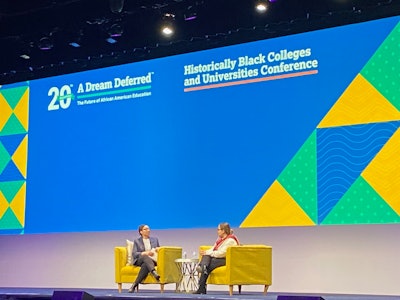NEW YORK—
 Dr. Brandi Waters, senior program manager of AP African American Studies at the College Board, and Dr. Ericka Armstrong Dunbar, professor of history at Rutgers University in New Brunswick, NJ.
Dr. Brandi Waters, senior program manager of AP African American Studies at the College Board, and Dr. Ericka Armstrong Dunbar, professor of history at Rutgers University in New Brunswick, NJ.
Her behind the scenes contributions on Fellowes’ series became so valued that Dunbar is now co-executive producer of the show, soon to be shooting its third season.
Even though working on a show like The Gilded Age was never something she saw for herself, Dunbar said it aligns with the purpose of her work. She is always looking to center the story of Black women in history, particularly to find ways to make those stories resonate with the students of today.
“We really want to pull these K-12 and higher education folks in and help them understand the importance of history, so they can combat what they confront right now, and they will continue to confront,” said Dunbar. “They have to see it as relevant and have connections to it. These stories help us understand women and race in this nation. We have to make the connective tissue attractive for these very global, social media children and young people. We must engage—otherwise, we’ll lose them.”
Dunbar shared her stories with the gathered crowd on the final day of the College Board’s "A Dream Deferred: a Historically Black College and University (HBCU) Conference." She and other scholars underlined the critical importance of HBCUs and an inclusive, expansive history curriculum being taught to students K-12 and beyond.
“This is a really pivotal time for AP African American Studies,” said Dr. Brandi Waters, senior program manager of AP African American Studies at the College Board.
Waters was instrumental in the development of the course. When it was introduced in 2023, Florida Governor Ron DeSantis criticized its inclusion of intersectionality among other ideas, and the state’s Department of Education sent a letter saying the curriculum “significantly lacks educational value.” Yet despite the back and forth between Florida and the College Board, the program has now spread to 700 schools with nearly 13,000 students enrolled.
America’s racial tension has been heightened by increasingly conservative Supreme Court rulings, book bans, and an increasing number of bans on Diversity, Equity, and Inclusion (DEI) programming in states across the country. Attendees at this year’s conference expressed both concern about the future and their continued dedication to HBCUs serving Black and Brown students on their way to successful careers.
Many scholars addressed the Supreme Court’s ruling on affirmative action and whether or not it might have a negative impact on HBCUs. As the ruling affects the admissions process and not the recruitment process, Dr. Anthony E. Jones, vice president of enrollment management and student experience at Bethune-Cookman University, said that HBCU enrollment should be fine, for the moment. But the current political environment is troubling, he said.
 Dr. Danisha Williams, director of admissions at Lincoln University of Missouri; Dr. Juan M. Alexander St, associate vice president for enrollment management at Norfolk State University; Dr. Anthony E. Jones, vice president of enrollment management and student experience at Bethune-Cookman University.
Dr. Danisha Williams, director of admissions at Lincoln University of Missouri; Dr. Juan M. Alexander St, associate vice president for enrollment management at Norfolk State University; Dr. Anthony E. Jones, vice president of enrollment management and student experience at Bethune-Cookman University.
HBCUs play a crucial role in educating Black people in America, a particularly noteworthy accomplishment considering how few resources the institutions actually have. According to the U.S. Department of Education, 16 states have underfunded their HBCUs by more than $12 billion between 1987 and 2020. Despite that, almost 30% of all undergraduate degrees awarded to Black students come from HBCUs.
“So, the question is, how do we fill the [resource] gap? We have to keep the lights on, pay faculty, and keep the grounds, but we can’t pass the cost of that to students,” said Jones. “Unfortunately, there’s going to be some tough choices to make, some funds going here versus there, something that should be done right away may have to be delayed. Those are the tough choices HBCU administrators are faced with every day of the week.”
But despite funding complications, HBCUs put students first. At Alabama State University in Montgomery and Johnson C. Smith University (JCSU) in Charlotte, NC, students are able to receive one-on-one coaching through InsideTrack, a nonprofit helping students achieve their educational goals. Through coaching, the students receive advice that goes beyond an advisor meeting, ultimately keeping them enrolled and on track to completion. Through the third-party feedback the institutional leaders receive from the coaches, the HBCUs are able to nimbly pivot to meet student needs.
“These types of partnerships have allowed us to give students access to something they deserve, to really feel they belong,” said Dr. Angela Michelle White, dean of University College and Student Success at JCSU. “That’s the goal of coaching: to help students grow into the individuals they came here to be.”
Liann Herder can be reached at [email protected].
















